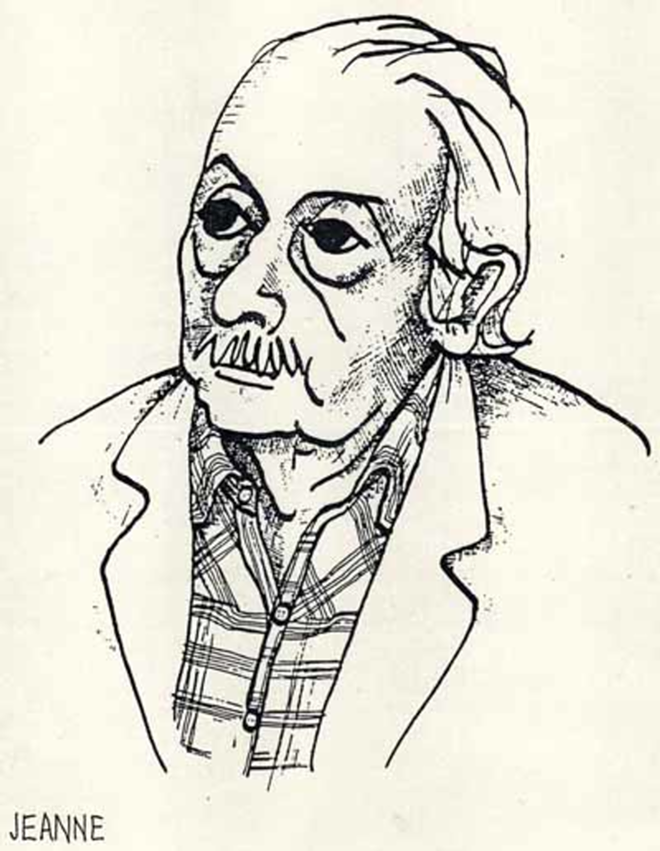I see the milestones dwindling
toward the horizon
and the slow fires trailing
from the abandoned camp-sites ...
—Stanley Kunitz, from "The Layers" (1978)
Once upon a time, in a previous century, our children enjoyed playing a game they called "Mommy and Daddy." Gretchen would putter in the kitchen, banging pots and pans around, while Tim would spin in vague circles, slapping his pockets and saying, "Where's my wallet? Where's my keys?"
I used to give them a fake frown, and ask, "What's so funny about that?" Now, at 75, I find the story comforting: "Look," I say, as I wander through our house patting my pockets, "this doesn't mean I'm old; I've always lost track of them!"
But this is grasping at straws. We've reached that time in life when people regularly abandon us. I could fill this page with the names of friends we've lost in the last few years. Oddly, even the death of acquaintances I didn't know well can upset me. The other day I read in my alumni magazine (Class of '55) of a classmate's passing. We were just casual friends as undergraduates, both drafted upon graduation; we never met again or even corresponded. But here I was, blinking my eyes, remembering his quick steps and sharp elbows when we played basketball, and how he'd start laughing after two beers.
The thought occurs to me that many of the people I'd like at my funeral are already dead.
While neither Jeanne nor I are particularly lugubrious, there's scarcely a town, restaurant, house or even a meal that doesn't elicit a memory pang — how X loved old churches, how Y loved desserts! And even with those who remain, like us, unseasonably chipper, our talk often furls creepily around health, operations and pains. We appear on the tennis courts wrapped in bandages and braces like so many Dunkirk survivors.
Earlier this year, in Bangkok, we were touring through the Jim Thomson House (he founded the silk business in Thailand). As we strolled through his garden, I suddenly toppled into the bushes like a shot deer. I got right up, brushing myself off, embarrassed. At my age it's hard to say if I had a mini-stroke or just forgot to keep standing. It was hypoglycemia, probably: The day was hot, and we were hungry. But things like this happen more and more frequently. The creaky circles in which we spin seem to make us dizzy — several of our friends have been carted from the tennis courts to the hospital. "Dying," said Andy Warhol, "is the most embarrassing thing."
John McCain will turn 72 on August 29, and the best thing about his run for the presidency is the sight of an old man making sense at least half the time (OK, maybe a quarter of the time) — but I like him when he's joking around: He seems to be enjoying the trip. Certainly, the voyage is the thing, not the ending. Columbus must have been happiest just before he discovered "America."
When I was a young teacher at Hamline University, the faculty table in the coffee room was headed by a crusty old rascal named Bob Holliday. On my first day of college teaching, in September 1961, I staggered out of my Composition 101 class and headed for coffee. He looked up and said, "Well, who's this? New blood!" Unfortunately, Jeanne and I had decided that summer to change the pronunciation of "Meinke" from "Mainkey" to "Minekey," and we still weren't used to it. "Hi," I blurted,
"I'm Peter Mainkey — I mean, Minekey!" There was an awkward silence. Holliday looked triumphantly around the room and bellowed, "Jesus Christ, they don't even know their own names any more!"
Over the next five years, there were many more laughs at the coffee table, not all at my expense, but before we left for Florida, he told us that when he turned 80 he wouldn't go out in public anymore. We protested, but he insisted. "In my experience, that's the cut-off — if not before — when people stop making sense and are just boring." A few years later, we called our friends from Hamline, and indeed, Holliday never was seen at school again.
Of course, that can't be right — at least, the cut-off date for each individual must vary. The amazing Stanley Kunitz (1905-2006) kept writing fine poetry into his 90s.
But usually the ending isn't good. I remember Mom and Dad on their deathbeds, confused, resigned, eyes deep in their sockets, focused inward. Jeanne's dad was sitting in a chair the day before he died. "I don't know what's happening," he said. "I've got the woopsies."
Well, enough of this, before I give you the woopsies. Anyway, Jeanne's calling. I think she's calling. My hearing's not what it used to be.
So let the battered old willow
thrash against the windowpanes
and the house timbers creak.
Darling, do you remember
the man you married? Touch me,
remind me who I am.
—Stanley Kunitz, from "Touch Me" (1995)
Peter Meinke believes his most recent collection of poems is The Contracted World.


